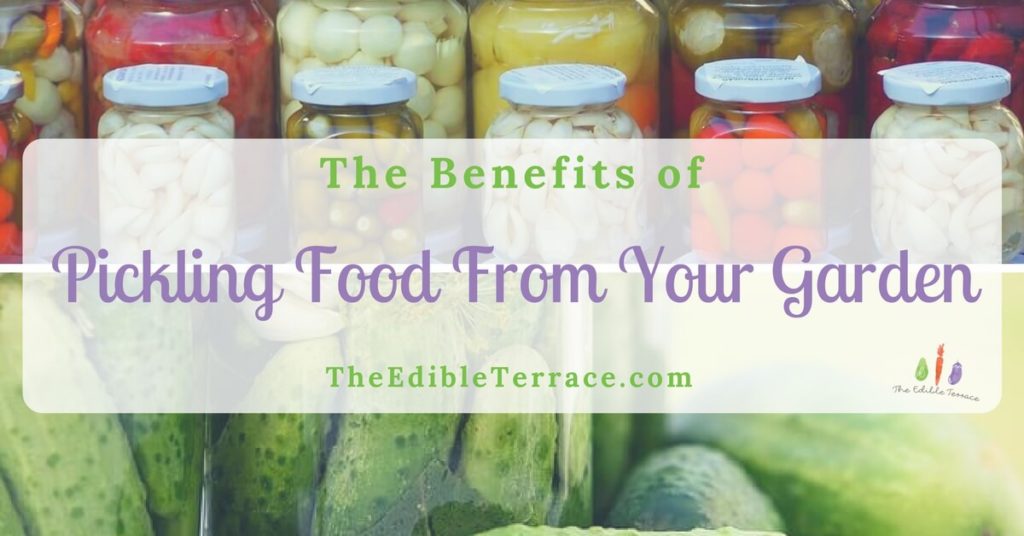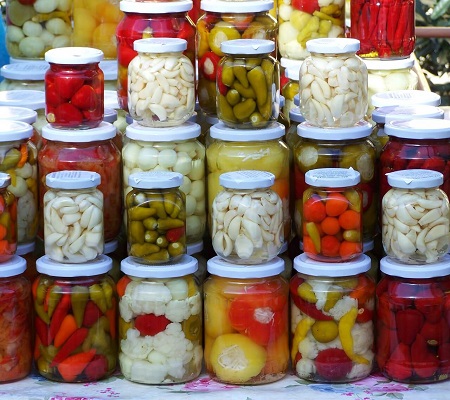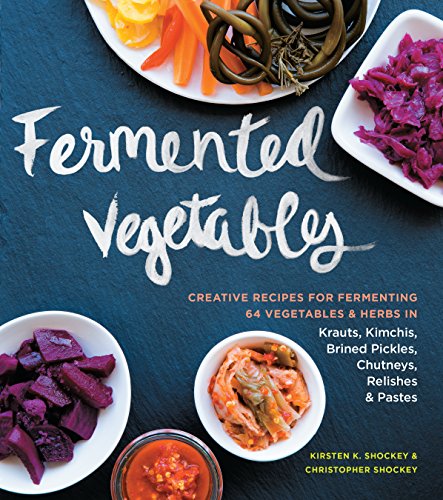Hey! By the way… TheEdibleTerrace is reader-supported. When you buy through links on our site, we may earn an affiliate commission and as an Amazon affiliate, we earn from qualifying purchases. Thanks in advance for your support!

Pickling is one of the oldest forms of food preservation. It involves submerging the food in either vinegar or a salt brine to keep it from spoiling. Spoiling is a process that involves bacteria, and not all bacteria are created equal when it comes to spoiling or preserving food. The benefits of pickling food from your garden goes beyond keeping it from spoiling though.
The goal with pickling is to prevent the bad bacteria from growing.
In the case of using vinegar to pickle, the high acidity of the vinegar prevents most bacteria from thriving, thus preserving the food as long as it is submerged in the vinegar solution.
With brine pickling, controlled fermentation is encouraged like in the case of sauerkraut and kimchi.
This allows beneficial bacteria to grow, who then crowd out any bad bacteria that will cause the food to spoil. The interesting thing is that the look, texture, and flavor of the food changes. The same thing happens with cheese by the way, which is fermented milk.
Fermented foods make a great addition to your diet. The beneficial bacteria in these foods are healthy for you and help you improve the bacteria that live in your gut. This, in turn, has a beneficial impact on anything from your digestion to your immune system.
In other words, eating pickled foods on a regular basis is good for you and your overall health.
Pickling is also one of the more cost effective ways to preserve food. And the same type of food can be pickled in a few different ways. Let’s take pickled cucumbers for examples, one of the most popular pickled foods in the US (at least if you consider the variety of different pickles in the grocery store).
Kosher pickles are the perfect example of cucumbers being preserved in a vinegar solution. Most dill pickles on the other hand are preserved in a brine. While that mixture may include vinegar, it also includes dill and other pickling spices and salt. Sauerkraut is another great example of fermented food, as is Kimchi.
Fermented pickled vegetables can be found across the globe and it’s a preservation method that has been used for thousands of years. There’s no need for power, cold temperatures, or special equipment.
As long as you have salt, you can figure out a way to ferment and preserve your harvest in one form or another.
As you can see there are many benefits of pickling food from your garden. It’s a fun and interesting aspect of food preservation to get into. Since each culture ferments different types of foods and in different ways, there are all sorts of various dishes to explore.
Would you like to learn a little more on basics of canning food? Check it out here.
Where To Find Great Deals on Produce To Preserve.
Fermented Vegetables: Creative Recipes for Fermenting 64 Vegetables & Herbs Easy Fermenter Wide Mouth Lid Kit: Simplified Fermenting In Jars Not Crock Pots!
Easy Fermenter Wide Mouth Lid Kit: Simplified Fermenting In Jars Not Crock Pots! Ball Pickle Crisp Granules – Won’t have to soak vegetables overnight or repeatedly rinse
Ball Pickle Crisp Granules – Won’t have to soak vegetables overnight or repeatedly rinse





